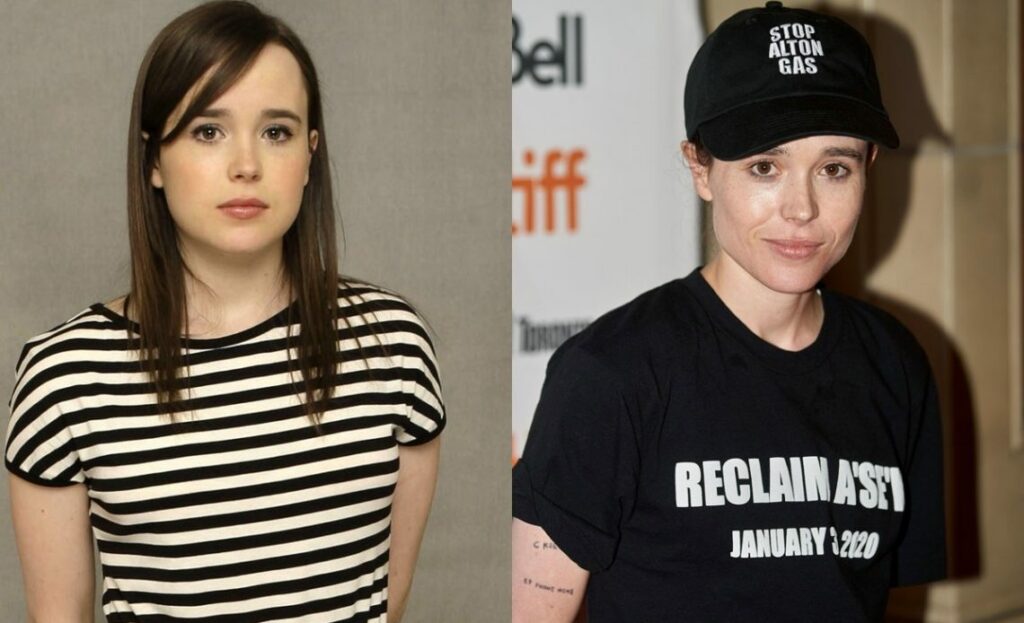Blog Post
The Agony of Ellen Page
Last year, Ellen Page—now going by ‘Elliot’ and identifying as a man—released the memoir, Pageboy. The bombshells in Pageboy were not the details of her ‘transition,’ which Page had already discussed at length in a high-profile interview with Oprah Winfrey and included a double mastectomy. (The press, in characteristically Orwellian fashion, used the phrase “removal of breast tissue” or “gender-affirming surgery.”) Rather, they were the tales of Hollywood’s dark side, written by Page herself rather than a ghostwriter. From a young age, Page was stalked by male predators and had a toxic relationship with her father. Throughout Page’s sad story, a consistent theme emerges: how badly she was treated by men.
After moving to Toronto from Nova Scotia at age 16, Page was stalked by an older male fan and feared for her life. Upon arriving in Hollywood, she was, as The Guardian put it, “the perfect target for predators.” A director groomed Page, took her to dinner, and then began stroking her thigh under the table, telling the teenage girl, “You have to make the move, I can’t.” Others were not so reticent. Reviews of Pageboy describing this grooming carefully refer to Page as a “he”; doing so undermines the power imbalance of the predation as well as the gut-wrenching, very female fear Page experienced. She was targeted because she was Ellen, not Elliot.
In a chapter titled “Leeches”—a telling reference to the slimy, bloodsucking parasite worm—she described how another male actor abused her. She had thought of him as kind, and thus she took him up on the offer of a drive home one day. Once there, he took her by the shoulders, guided her firmly into the bedroom, laid her on the bed, took her clothes off, and forced himself on her. She describes being paralyzed with fear; only after it was over did she regain her voice and order him to leave. She was only 17 years old, a short, slight teenage girl whose acting career had just begun to take off.
The following year, she starred in Juno (2006), earning an Oscar nomination for Best Actress. Page played a 16-year-old who gets pregnant, goes to an abortion clinic, and changes her mind at the last moment after one of her classmates who is protesting outside the clinic tells her that her baby has fingernails. She decides to give the baby up for adoption instead and begins to spend time with the couple she has chosen—until the middle-aged husband hits on her. Knowing now what Page was enduring in Hollywood at the time, the storyline is eerily apt. Unsurprisingly, she writes that some of the films she acted in traumatized her because they were, in many instances, far too close to real life.
Nobody knew, as Page’s fame grew, what predatory men in Hollywood were doing to her. She had a waif-like, vulnerable, wide-eyed demeanor that should make men feel instinctively protective, but to a certain sort of man marked her as prey. Her vulnerability as a teen girl in a cutthroat industry should have gained her protection; instead, it made her a target. When she came out as a lesbian, a famous actor—whom she does not name—told her, drunkenly, that he would “f**k” her to prove to her that she was straight and graphically described the things he would do. “He was, and still is, one of the most famous actors in the world,” Page wrote, but provides no further details.
On December 1, 2020, Page came out as ‘transgender’ on social media; a TIME cover story the following year featured a ‘post-transition’ Page wearing masculine clothes and a quizzical, squinting expression. The photo does not convey what the magazine intended; Page gives the impression of someone who has endured (or is enduring) a tragedy, not undergone a beautiful transition. She told TIME that she had finally found herself in ‘Elliot,’ but she looked lost; the headline announced, “I’m fully who I am.” Undergoing medical “transition,” she said, rescued her from the “total hell” she’d suffered since puberty, and she was recovering nicely from surgery. She also described the anxiety and depression she’d endured and that trans activists such as Laverne Cox had been helpful in her journey; P. Carl’s memoir Becoming a Man was a favorite. In her memoir two years later, she revealed that she had a psychotic breakdown a week prior to her surgeries and that voices in her head told her to transition.
The cover story proved to be a powerful piece of normalizing propaganda for the transgender movement. Page’s decision to have her breasts surgically removed (she referred to herself throughout the interview as a “transgender guy” but also as “nonbinary” and “queer”) has been highlighted as a beautiful thing; she finally feels like herself now that parts of herself have been excised. The press coverage of Page’s journey makes it clear that questions are for ‘transphobes,’ and that responses to this story should be celebration or silence. Ellen Page is a man, and by becoming ‘Elliot,’ she has emerged from the cocoon of her femininity and now manifests ‘trans joy.’ In public appearances, however, Page looks sad and vulnerable.
READ THE REST OF THIS COLUMN HERE









It almost sounds like she needed to rid herself of everything female to clean the abuse off.
Seems like she needed therapy and security. Cutting your breasts off and announcing you’re a man doesn’t absolve you of the trauma you experienced. What a irrational thing to do, and I wonder if there was a outside force coercing Elliot to transition.
he*.
Igual siendo hombre puede sufrir abusos..